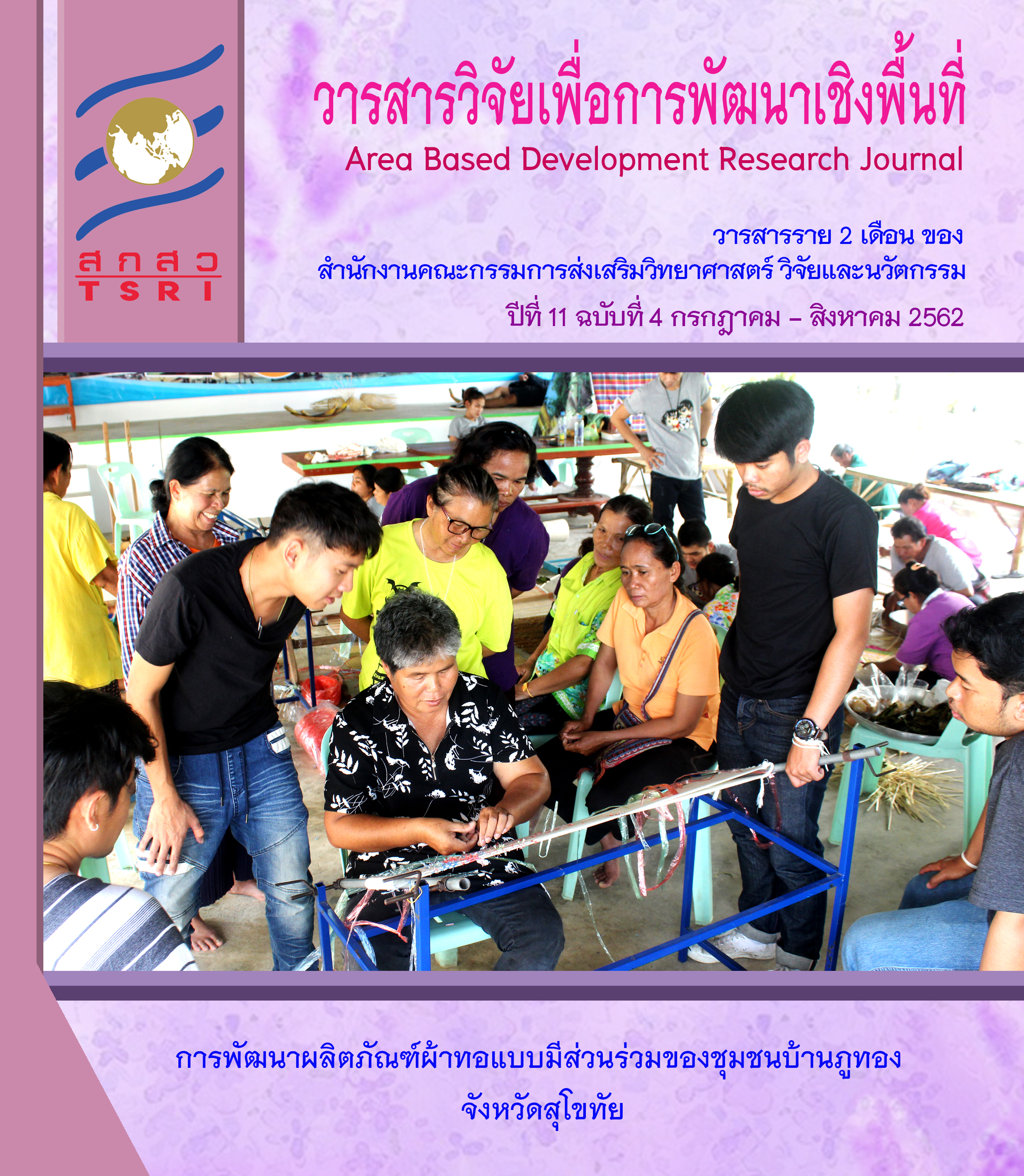Developing the Krajood Product Business Management of the 151st Infantry Regiment, Fourth Royal Thai Army Housewives Groups
Main Article Content
Abstract
The efficient business management affects the success of business operations. This research aims to develop the Krajood product business management of the 151st infantry regiment, fourth royal Thai army housewives’ group. The data was collected through group interviews, focus group discussions, and actual involvement in developing the business management of this group with the focus on the participation of group members throughout the entire process of development. They are involved in analyzing their business situation, defining guidelines for business management development and developing business management. The results reveal that this housewives’ group has changed in various aspects. 1) Group management aspect: the group has clear plans and management structure. Members of the group increase their business management capabilities and continuously operate their strong business. The group is legally registered for integration by community enterprise and an OTOP manufacturer and operator. Therefore, the government agencies support it by providing new machines, promoting a chance to join trade shows and enhancing the production knowledge of the members. 2) Finance and accounting aspect: the group has more income per month (25,000-30,000 baht) than previous months (10,000-12,000 baht). Besides, group members have correct knowledge and skills in accounting. 3) Production aspect: the group increases its production capacity due to more manpower and efficient machinery. Better productivity of the group members makes them receive community product standards for their products. 4) Marketing aspect: the group produces new products with added value, brand, product story, product detail, and product label. There are more distribution channels than before via fairs, online social media, and marketing mediators. Additionally, this group can establish the workplace to be a learning center for the community which strengthens the relationship and positive attitude of the people towards the military.
Article Details

This work is licensed under a Creative Commons Attribution-NonCommercial-NoDerivatives 4.0 International License.
Area Based Development Research Journal values copyright protection and licensing to safeguard author rights and facilitate the appropriate dissemination of research. Our policies ensure openness, accessibility, and attribution. Authors retain copyright ownership, and articles are published under a Creative Commons Attribution License (CC BY), allowing sharing, adaptation, and proper attribution. Authors have the freedom to publish under the CC BY license, granting broad reuse and distribution permissions. The journal supports posting articles on third-party repositories, adhering to institutional and funding restrictions. Author guidelines detail copyright and licensing requirements, empowering authors with knowledge about their rights and responsibilities. These policies cultivate an environment of collaboration, openness, and responsible sharing, benefiting authors and the research community while honoring intellectual property rights.
References
ฉัตยาพร เสมอใจ. (2558). การจัดการธุรกิจขนาดย่อม. กรุงเทพฯ: ซีเอ็ดยูเคชั่น.
ชุติมันต์ สะสอง. (2559). ความรู้เบื้องต้นในการประกอบธุรกิจ. เชียงใหม่: มหาวิทยาลัยราชภัฏเชียงใหม่.
ณรงค์ อนันต์เลิศสกุล และ จิรศักดิ์ จิยะจันทน์. (2561). แนวทางการบริหารจัดการองค์กรเพื่อเพิ่มศักยภาพในการดำเนินงาน วิสาหกิจชุมชนที่ผลิตสินค้าโอทอป กรณีศึกษา ประเภทสมุนไพรที่ไม่ใช่อาหารในพื้นที่ภาคใต้. วารสารปัญญา ภิวัฒน์, 10(2), 128-135.
ธงพล พรหมสาขา ณ สกลนคร. (2556). การจัดการและการพัฒนาวิสาหกิจชุมชน. สงขลา: สถาบันสันติศึกษา มหาวิทยาลัย สงขลานครินทร์.
ธนวุฒิ พิมพ์กิ. (2558). การบริหารธุรกิจขนาดย่อม. กรุงเทพฯ: โอเดียนสโตร์.
นภวรรณ คณานุรักษ์. (2559). กลยุทธ์การตลาด (พิมพ์ครั้งที่ 3). กรุงเทพฯ: ทริปเพิ้ล กรุ๊ป.
ปรียาวดี ผลเอนก. (2557). การบริหารการผลิต. กรุงเทพฯ: จุฬาลงกรณ์มหาวิทยาลัย.
พิบูล ทีปะปาล และ ธนวัฒน์ ทีปะปาล. (2559). การจัดการเชิงกลยุทธ์. กรุงเทพฯ: อมรการพิมพ์.
พิเชษฐ์ สิทธิโชคสกุลชัย. (2559). การจัดการการเงินสำหรับผู้ประกอบการ. ใน เอกสารการสอนชุดวิชาการสร้างธุรกิจและการเป็นผู้ประกอบการ (พิมพ์ครั้งที่ 5). นนทบุรี: มหาวิทยาลัยสุโขทัยธรรมาธิราช.
เลิศชัย สุธรรมานนท์. (2560). กลยุทธ์การบริหารทรัพยากรมนุษย์เพื่อองค์กรยั่งยืน. กรุงเทพฯ: จุฬาลงกรณ์มหาวิทยาลัย.
วัฒนา ศิวะเกื้อ, ดุษฎี สงวนชาติ, และ นันทพร พิทยะ. (2559). การบัญชีขั้นต้น (พิมพ์ครั้งที่ 8). กรุงเทพฯ: จุฬาลงกรณ์ มหาวิทยาลัย.
ศิริพร สัจจานันท์. (2558). ความหมาย ความสัมพันธ์ และประโยชน์ของการติดตามและประเมินผลโครงการ ใน เอกสารการ
สอนชุดวิชาการวิเคราะห์โครงการและแผนงาน. นนทบุรี: มหาวิทยาลัยสุโขทัยธรรมาธิราช.
สมคิด บางโม. (2558). องค์การและการจัดการ (พิมพ์ครั้งที่ 7). กรุงเทพฯ: วิทยพัฒน์.
สมชาย หิรัญกิตติ. (2559). การจัดการผลิตและการดำเนินงานสำหรับผู้ประกอบการ. ใน เอกสารการสอนชุดวิชาการสร้าง
ธุรกิจและการเป็นผู้ประกอบการ (พิมพ์ครั้งที่ 5). นนทบุรี: มหาวิทยาลัยสุโขทัยธรรมาธิราช.
สำนักงานคณะกรรมการพัฒนาการเศรษฐกิจและสังคมแห่งชาติ. (2559). สรุปสาระสำคัญแผนพัฒนาเศรษฐกิจและสังคมแห่งชาติฉบับที่สิบสอง พ.ศ. 2560- 2564. กรุงเทพฯ: สำนักงานคณะกรรมการพัฒนาการเศรษฐกิจและสังคมแห่งชาติ.
สุดารัตน์ พิมลรัตนกานต์. (2560). การเป็นผู้ประกอบการ. กรุงเทพฯ: ซีเอ็ดยูเคชั่น.
สุภาวดี พนัสอําพน, บัณฑิต พิรินาสัยสันติ, พลศักดิ์ จิรไกรศิริ, และ วิพร เกตุแก้ว. (2561). การพัฒนาการบริหารจัดการวิสาหกิจชุมชนเพื่อยกระดับการเป็นผู้ประกอบการด้านอุตสาหกรรมอาหารแปรรูป ในพื้นที่ภาคตะวันตกของไทย. วารสารดุษฎีบัณฑิตทางสังคมศาสตร์, 8(1), 77-87.
อวยชัย ชบา และทิพวรรณ หล่อสุวรรณรัตน์. (2559). แนวคิดเกี่ยวกับการบริหารรัฐกิจและรัฐประศาสนศาสตร์. ใน เอกสารการสอนชุดวิชาความรู้เบื้องต้นเกี่ยวกับการบริหาร (พิมพ์ครั้งที่ 5). นนทบุรี: มหาวิทยาลัยสุโขทัยธรรมาธิราช.
อุทัย ปริญญาสุทธินันท์. (2560). “วิสาหกิจชุมชน” ปฏิทรรศน์ในการแข่งขันทางธุรกิจ. วารสารมหาวิทยาลัยศิลปากร ฉบับภาษาไทย, 37(2), 131-150.
เอกชัย บุญยาทิษฐาน. (2556). คู่มือการวิเคราะห์ SWOT อย่างมืออาชีพ จุดเริ่มต้นของยุทธศาสตร์ที่ไม่ทำไม่ได้ (พิมพ์ครั้งที่ 2). กรุงเทพฯ: ปัญญาชน.


